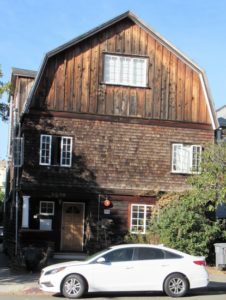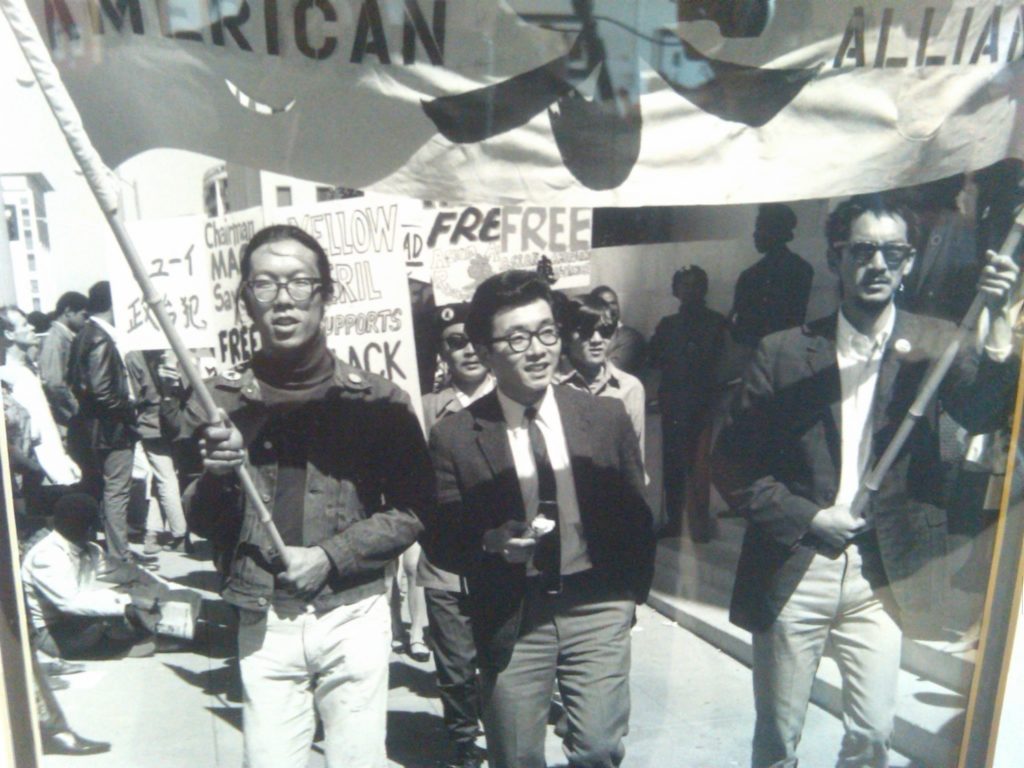 New and old members of the Asian American Political Alliance gathered on Hearst Avenue at the University of California, Berkeley to commemorate the birth of the Asian American movement, reports KQED.
New and old members of the Asian American Political Alliance gathered on Hearst Avenue at the University of California, Berkeley to commemorate the birth of the Asian American movement, reports KQED.
Emboldened by the civil unrest of the Vietnam War and inspired justice work of the Black Power Movement, Ph.D. students Yuji Ichioka and Emma Gee, formed the Asian American Political Alliance, or AAPA, by searching for Asian last names in directories of other student political organizations.
The creation of AAPA was the first time American students of different Asian descent were brought together as one unified entity that was not in context to White or Black groups. The photo to the left is the home in Berkeley where the first meeting took place and where a plaque was dedicated Saturday to the birth of the Asian American movement 50 years ago. (Photo: Berkeley Historical Plaque Project)
Early AAPA member Vicci Wong, who attended the 50th anniversary of AAPA on Saturday, said that she faced challenges finding a place to fight for justice. She said to KQED, “The peace movement was led by Whites.” Wong added, “…and then I tried to join the Black Panther Party in Oakland, and they told me you can’t because you’re not Black. So they said you should form your own group, and I thought, ‘Well, what is my group?”
During their first official meeting at the house on Hearst Avenue, six individuals of the organization who were of various Asian ethnicities not only saw faces that represented their community but also left with a term for who they were.
Wong said to KQED, “I went in Oriental and left Asian American.”
While Asian American is a widely used identifier today, it wasn’t popular during the period when Ichioka and Gee created AAPA (pictured above from left to right from AAPA Archive). Ronald Quidachay, co-founder of the Philippine American Collegiate Endeavor (PACE) at the former-San Francisco State College, said to NBC News that no one was referring to themselves as Asian.
According to NPR, AAPA advocated for coming together under one “pan-ethnic” identity to also move away from the outdated, pejorative “Oriental” used for people of Asian descent back then. To Ichioka, uniting under a common identity also meant “power in numbers” to advocate for anti-racist and anti-imperialist work that extended beyond the Asian American community while supporting larger social causes, like socialist policies, the Black Liberation Movement, and the Women’s Liberation Movement.
Even though AAPA has seen an organizational decline and rebuilding since its inception—from the disbanding of the original group to its second branch in the 1980s—students now have this historic reminder on Hearst Ave and are in the works of forming an “AAPA 3.0” at Berkeley.
50 years ago, my Aunt Vicci met with 5 other Cal students & founded the Asian American Political Alliance, which helped establish the first Ethnic Studies depts. Now they have a plaque commemorating their resistance. As AV would say: “Power to the people!” https://t.co/Egjz944Ek5 pic.twitter.com/ahBAYh6aMN
— Amelia Wong (@amelialikespie) November 15, 2018
AAPA original member Floyd Huen worked with the original property owner of the house where AAPA first met, and with Berkeley City Councilperson Kate Harrison to figure out a proper historic designation, reports The Daily Cal. They installed a commemorative plaque that recognizes this important history of the Asian American movement; the last line of the piece reads: “The strikes here and elsewhere spurred the creation of ethnic studies and social justice programs and encouraged self-determination.”
Pulitzer Prize Novelist Viet Thanh Nguyen, known for his works The Sympathizer and The Refugees, was also a former member of AAPA. He shared KQED’s article and tweeted about the prolific impact this organization has had on his life. Nguyen said, “I came to UC Berkeley in 1990, was immediately radicalized in my Asian American studies classes and through the Asian American Political Alliance. I was co-chair for one year of AAPA. Long live the Asian American movement!”
I came to UC Berkeley in 1990, was immediately radicalized in my Asian American studies classes and through the Asian American Political Alliance. I was co-chair for one year of AAPA. Long live the Asian American movement! https://t.co/hzQx81tCfN
— viet thanh nguyen (@viet_t_nguyen) November 14, 2018
AsAmNews has Asian America in its heart. We’re an all-volunteer effort of dedicated staff and interns. Check out our Twitter feed and Facebook page for more content. Please consider interning, joining our staff or submitting a story.



RE: Activists Commemorate 50 Years of the Asian American Movement: Thank you for this article! I was part of the Asian American art movement and scene in the same era where we too organized and found our common identity and created works of art reflecting this new ‘us’ – dance, theater, literature, painting, graphics, music, you name it, we did it. As original members of driving this movement it was very exciting and probably saved many of us from being ‘bananas’ for the rest of our lives! This was in the SF Bay Area. Where else!? And many of us have continued to this day in creating successful and ongoing arts organizations still thriving, as awarded artists, or leading successful careers in Hollywood. Yay for Asian Americans!